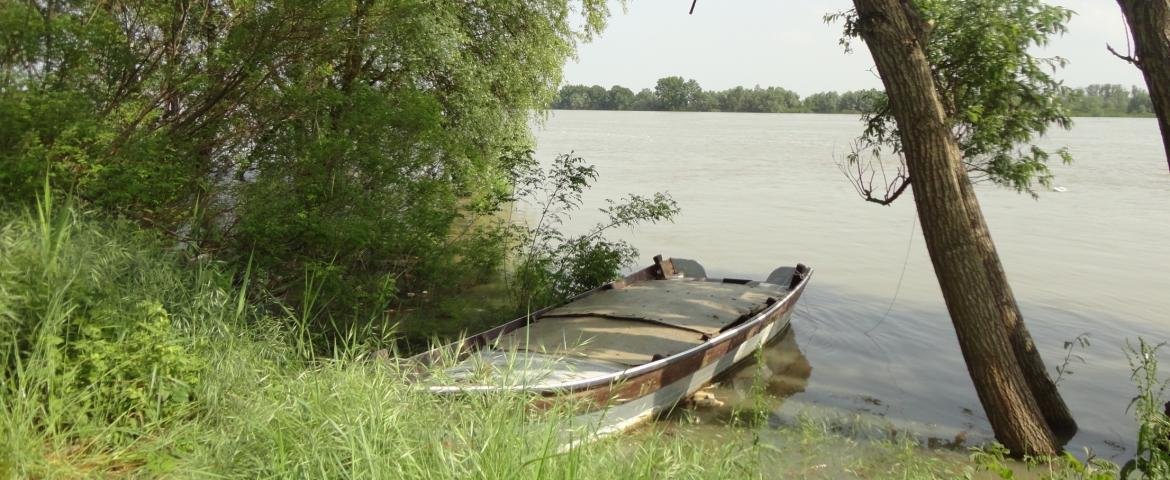
The winding river landscape upon which the Republic of Bosgattìa was built
❝The island of Balutìn stretches between the bends of the Po River, slowly flowing towards the sea. It is surrounded by an untrammelled river environment, characterized by lush woods and immersed in the placid flow of water. The pleasantness of this place led the scholar Luigi Salvini to declare it as the "Tamisiana Repubblica di Bosgattìa" – the utopian autonomous state that even minted its own currency.❞
The Balutìn island, which today is a WWF oasis, can be found in a bend of the Po river, a few kilometres south of the town of Adria. The island environment is typical of this area and over the years it has been subject to the constant morphological evolution of the Po river. Indeed, at one time the island was linked to the Panarella floodplain, on the left bank, in the territory of Papozze, while today, after some changes in the river course, the Balutìn island has passed over to the Municipality of Corbola, on the right bank.
The island enjoyed a certain notoriety between the 1940s and 1950s, when the Slavic scholar Luigi Salvini founded the "Tamisiana Repubblica di Bosgattìa": a place that was deliberately detached from the comforts of the wider world, an island that was protected by the waters of the river, in which man and nature could once again become one. The "Bosgattesi", the followers of the dreamer scholar who spent summers in this remote place espousing the idea of autarky, lived in tents, devoted themselves to fishing and used their own currency. This unique life experience is narrated by Salvini himself in the book Una tenda in riva al Po (A tent on the banks of the Po), which describes the special context in which the activities of the Republic's inhabitants took place: “Almost in the middle of the river, full of marshes and willows, with a crescent-shaped beach covered with dazzling white sand, an island had re-emerged: the Balutìn, which the flood had spared, and which had almost been enriched like a daughter. At its feet, the great river ran with reflections of copper, melting into the water that moved against certain surfaced dunes; and the first new grass, a tender and innocent green, already filled the shores. And the Bosgattesi, crossing the mud and the water, carried the tent and the largest boat on their shoulders”. Those who went to the "Tamisiana Repubblica di Bosgattìa", writes Salvini "could certainly not lie on their stomachs in the sun, but to live they had to make do with what nature offered, which was actually very generous, by hunting and above all fishing."
Although it was occupied only during the summer, the island, while it existed, came to issue its own currency, passports and even stamps. And because of this, it even attracted attention from European journalism, which considered this experiment as a new cultural and social phenomenon that ran against the grain of convention. Indeed, it can also be seen as the origins of a new "modern" experience of tourism.
Today, the island of Balutìn still retains certain curiosities, such as the possibility of getting an official "visitor's certificate" for those who come here, otherwise known as the 45th parallel north, i.e. exactly 5000 kilometres from the North Pole and 5000 kilometres from the equator. Those who visit the Balutin, if they wish, can get this curious “certification” free of charge, created by the Accademia del Tartufo del Delta del Po (the Po Delta Truffle Academy), by sending a request email to a.tartufo@libero.it, indicating your name, surname and day of the visit.
By train: the island is situated about 13 km from Adria station, with good cycle-rail interchange facilities.
Where to eat:
we suggest Risto-pub e pizzeria Brasserie (Via Curicchi 12, Bottrighe; tel. 0426 993054) and Ristorante Country House (Via Pilastri 5600, Corbola; tel. 0039 333 276 5431).
Where to stay:
we recommend B&B Corte Bolandina and locanda La Petite Maison.
Tours and bike & boat rental:
for bike and horse trips and boat tours please refer to the website of Parco Delta del Po.
Marshy areas and fishing valleys in the Delta of the wild Po di Maistra
An interactive journey recounting the history of "liquid civilizations" shaped by the Po
The ancient coastal landscapes reflected in a dense coastal forest and unique biodiversity
A sandy stretch of land at the mouth of the Po, rich in biodiversity and literary references